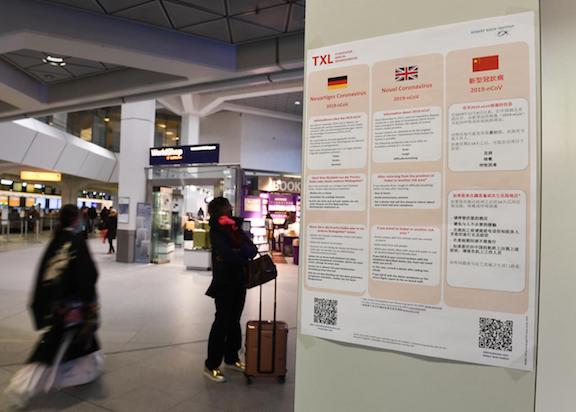Near the famous Hofbraeuhaus beer hall in downtown Munich, a printout taped to the glass door of a pharmacy conveys the anxiety gripping the city at the center of one of the biggest coronavirus outbreaks outside China.
In plain lettering, the sign declares: “SOLD OUT protective mask.” It’s a contrast to the sober public-service posters at Munich airport, where authorities inform travelers in tiny German, English and Chinese lettering how to recognize symptoms and what to do.

New details about the disease—like the fact that people are now getting sick who haven’t been in China and catching the virus from someone who didn’t show symptoms at the time of contact—are fueling public concerns.
That’s created a run on medical masks in Munich, where the face coverings are a rarity on its clean and orderly streets. At least three pharmacies in the city center said they were sold out as of Wednesday morning.
“We had about 50 people come in and ask yesterday,” pharmacist Nicole Witt said between serving customers at Rumford Apotheke near the city’s open-air Viktualien food market. Her shop has ordered more face masks, but they won’t arrive before next week.
German officials are trying to ease anxiety. Health Minister Jens Spahn told reporters in Berlin on Wednesday: “I would urge people to be calm but vigilant.”
The government will evacuate about 100 Germans from Wuhan on Friday using a military plane. Upon arrival in Frankfurt, they will be kept under quarantine for two weeks, officials said at a regular government press briefing on Wednesday.
The head of Bavaria’s infectious disease task force said Tuesday after the first German case was confirmed that the risk to the public was probably low. He said people should nevertheless take usual precautions including washing their hands after riding on a bus or subway.
“Now that I know, first thing I’ll do when I arrive at work is wash my hands,” Alexander Wegmann said Wednesday morning while leaving the subway at Munich’s central square, Marienplatz, beneath the city hall. “You do kind of look around and worry about who might be infected.”
The German scare started on Monday. A 33-year-old man from the foothills of the Alps who’d been feeling sick over the weekend showed up for work at Webasto, which makes vehicle heating and cooling systems and has a facility in Wuhan. His bosses told him to go to the doctor, and by evening, he was confirmed as the first German to contract the disease.The way in which the man had caught the virus raised alarm in Germany. A Chinese colleague last week visited the company’s headquarters in Stockdorf, a small town of about 4,000 people a half hour south of Munich. The worker had stayed for four days, then returned to China and started feeling sick on the flight back, officials said.
Later Tuesday, it emerged that three more employees from the Stockdorf office had also been confirmed sick with the coronavirus, while still more were undergoing testing. Authorities said Tuesday night that they had also identified 40 other employees at the company who may be at risk.
Webasto instructed all of its employees that they’re free to work from home through the rest of the week and canceled all business trips to and from China for at least the next two weeks. Webasto’s headquarters was closed on Wednesday.
The confirmed patients are all being treated in an isolation ward at a hospital in Munich’s Schwabing neighborhood, a residential district in the city’s north. Both the Chinese employee and the first German identified as sick were reportedly in good condition on Tuesday.
The spread of the disease is having ripple effects across Germany. Deutsche Lufthansa AG has seen business travel between Germany and China take a hit due to fears about the virus. The airline, which hasn’t canceled any flights, is taking precautionary measures and intensifying its usual hygiene practices.
Industrial conglomerate Thyssenkrupp AG, which generated over 3 billion euros ($3.3 billion) in sales in China in 2018 and employed over 17,000 people there, has advised against business travel to the country.
Advanced manufacturing firm Manz AG, a producer of components for the energy and electronics industry, canceled all near-term business trips to China, adding it was closely monitoring developments. Ten staff members who were working at various locations in China returned to Germany.
Back in Munich, Luana Deichmann was waiting for a friend to arrive from Brazil, wearing a face mask and holding a sign that said “Welcome to Bavaria” in Portuguese. Deichmann, who lives close to the area where the four cases were discovered, said she was wearing the mask merely as a precautionary measure and not out of fear.
“I always think I’m healthy, but I work with tourists, so it’s good to take care of yourself,” she said, adding that she advised her traveling friend to wear a mask on the plane and carry hand sanitizer to minimize risks. “It’s not so dramatic that I would tell him not to come to Munich.”











